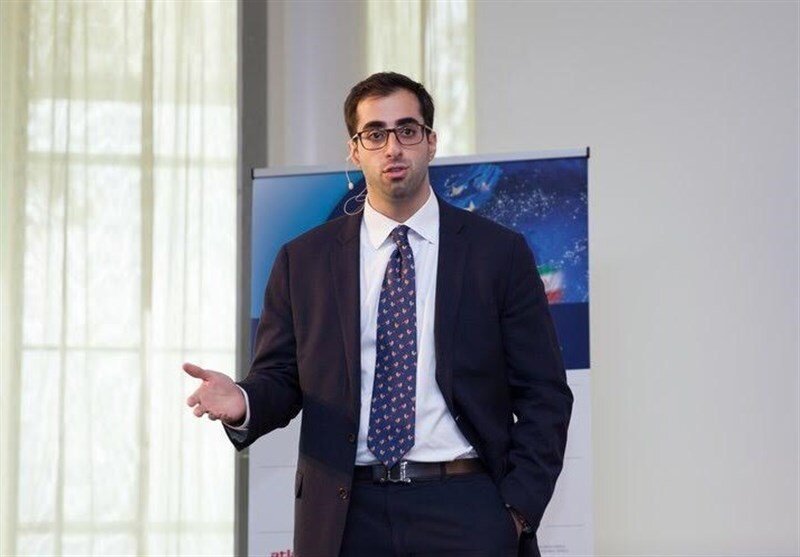White House narrative on JCPOA incoherent: analyst

TEHRAN – The founder of media company Bourse & Bazaar says the Trump administration’s approach toward the 2015 nuclear deal between Tehran and world powers is incoherent.
“The Trump administration’s narrative on Iran’s nuclear program is incoherent and this reflects that different figures in the administration have different assessments of what satisfactory non-proliferation controls entail,” Esfandyar Batmanghelidj told Tasnim in an interview published on Monday.
Batmanghelidj is founder and publisher of Bourse & Bazaar, a media company that supports business diplomacy between Europe and Iran through publishing, research, and events, such as the annual Europe-Iran Forum.
Aside from his contributions to Bourse & Bazaar’s own platform, Batmanghelidj’s writing on Iranian business and politics has been published in Foreign Policy, Bloomberg Opinion, Al Monitor, Quartz, and Asia Times. His scholarship on Iranian political economy has been published in the Encyclopedia Iranica and the journal Iranian Studies. Batmanghelidj is a graduate of Columbia University.
“It would be a mistake to reject INSTEX because it doesn’t solve all of Iran’s economic problems—it is part of the solution.”
On the European Union’s approach to Iran’s policy towards the JCPOA, Batmanghelidj said, “So far, European officials have understood that Iran’s moves to scale back its compliance with the JCPOA are intended to be gradual and reversible. However, there are risks to Iran’s approach. On one hand, escalation, whether around the nuclear deal or other points of tension, helps make sure that the Iran file remains a priority at the highest levels in European governments, increasing the likelihood that Iran can get the significant political and economic support it needs to address U.S. pressure. But, on the other hand, reduced compliance with the JCPOA and actions such as the seizure of tankers will provide a justification to European officials and politicians who, like many U.S. figures, are skeptical of Iran’s non-proliferation intentions and concerned about its regional role. As the escalation continues, the voices who argue that Europe should join the U.S. maximum pressure campaign on Iran will gain influence.”
On U.S. President Donald Trump’s approach to the Iranian nuclear program, he said, “The Trump administration’s narrative on Iran’s nuclear program is incoherent and this reflects that different figures in the administration have different assessments of what satisfactory non-proliferation controls entail. But the lack of consensus presents an opportunity for Iran, which can use direct negotiations to shape the view of Iran’s nuclear program. It is likely that Trump could be personally convinced to accept a deal close in form to the JCPOA as he is simply looking for a political win. But some in his administration will try to prevent new negotiations for precisely this reason.”
When asked about his opinion of the EU’s financial mechanism for trade with Iran, i.e. INSTEX, Batmanghelidj said, “I have no doubt that Europe is serious about the INSTEX mechanism. Though its development feels slow, Europe has worked remarkably quickly to create a state-owned mechanism with ten shareholders and an innovative structure. Those who are disappointed that the mechanism will not be linked to Iran’s oil exports need to consider that INSTEX is a specific tool for a specific problem. The European companies operating in Iran employ thousands of Iranians, import and produce important products and technologies, and contribute hundreds of millions of euros to the Iranian economy as the result of direct investment. European executives have made it clear that INSTEX provides a payment solution and political protection which can help their companies remain in Iran in the face of huge pressure from the U.S. It would be a mistake to reject INSTEX because it doesn’t solve all of Iran’s economic problems—it is part of the solution.”
Elsewhere in the interview, he was asked whether the JCPOA could be saved, he answered, “Some say it is impossible to save the JCPOA. But it is important to remember that many believed it would be impossible to achieve the JCPOA when negotiations began years ago. At this moment, it remains achievable that the U.S. and Iran could enter into new negotiations—encouraged by Europe—based on a basic respect for the JCPOA. If talks begin, the impossible can happen again.”
SP/PA
Leave a Comment